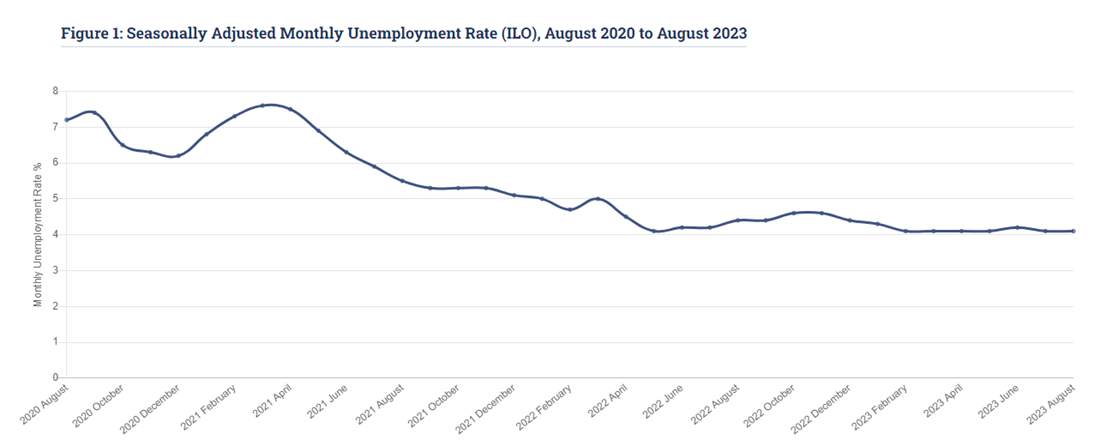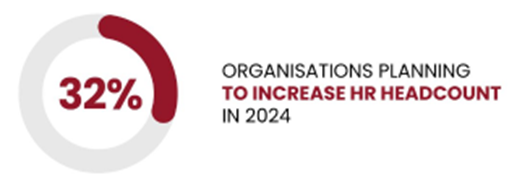Designing and planning an HR strategy for 2024 is a critical task for any Organisation. It involves aligning a strategic approach to human resources with the Company’s overall business goals and objectives. A clear road map setting out how your Company will manage Human Resource plans for the new year requires a current and deep understanding of what is happening in the labour market – what trends are influencing people management and how to implement them to be successful at attracting and maintaining your workforce.
External influences also need to be considered when planning for the year ahead. The Economic, Social and Research Institute (ERSI) announced that the post covid bounce in the Irish economy is over with Gross Domestic Product (GDP) set to fall by 1.6% this year. While the overall budget assessment was positive, the ERSI announced that measures taken as part of the Budget 2024 should insulate most households from rising prices through higher inflation next year[1]. So, the question is how will the economic forecast affect your business and headcount needs for 2024?
Ireland’s unemployment rates in general have steadily declined since 2020 apart from a small increase in 2021. A predicted 4% rate of unemployment for 2024 (ERSI) on a positive note, means more people in employment and therefore more money in circulation feeding the growth of the economy. On the other hand, it leads to a rise in demand for goods and services and is linked to higher inflation.
From an HR perspective, this results in the talent pool being smaller and the recruitment of suitable and skilled Employees being more difficult. Employees also have more bargaining power which can lead to potentially increased salary expectations and adds more pressure on the overall success and profitability of an Organisation.


Investment in Strategic HR
Successful management of Strategic HR within your Organisation will result in a positive return on investment. In order to generate the business case for further investment in your HR function it is essential to link your HR metrics to business outcomes.
To demonstrate return on investment from HR initiatives, it’s crucial to link HR metrics to broader business outcomes. For example, connecting Employee engagement scores with customer satisfaction or linking training investments to improvements in product quality can show how HR activities contribute to the Organisation’s success.
By making these connections, HR can justify its investments and showcase how they positively affect the bottom line. This not only helps HR in decision-making but also enables the Organisation to invest strategically in HR programs that yield the highest return on investment.
For 2024, our recent HR Barometer Series 7.2 highlights that 32% of participating Organisations plan to increase their HR headcount in 2024, signalling the additional investment in HR is front and centre for one in three Organisations and strategic priorities are further recognised and valued.

Some Key consideration for People Management for 2024
The recent HR Barometer Series 7.2 has analysed the current HR landscape and findings revealed businesses are expecting a 12.4% Employee turnover. With a tight labour market this figure could increase in 2024 and with 42.6% of Organisations participating in our research stating that recruitment and talent acquisition is a priority for them and 54.9% citing retention a top priority for next year, this clearly indicates the need for careful planning by management. Organisations should use their HR metrics to analyse the architecture of their current and potential future workforce and create a framework for skill development that aligns with their business goals.
Talent Management
Retention needs coupled with recruitment & talent acquisition priorities in 2024 means that talent management must be approached in a very strategic manner.
Talent management is a critical function that plays a central role in achieving an Organisation’s long-term goals and maintaining a competitive edge in today’s dynamic business environment. It helps ensure that the right people are in the right positions, and it promotes a culture of continuous learning and development. Effective talent management can lead to increased productivity, innovation, and Employee satisfaction, ultimately contributing to an Organisation’s long-term success.
Talent management frameworks must essentially be tailored to your Organisation constructed from the specific needs of the business and integrated with your business operations. The key considerations are outlined below.
Assessment of Current Talent: The first step is to assess your Organisation’s current talent pool. Identify skills, competencies, and potential gaps.
Define Talent Needs: Determine the talent needs of the Organisation both now and in the future. What skills and capabilities will be critical for success?
Recruitment and Onboarding: Develop effective talent acquisition, recruitment and onboarding processes to attract and assimilate top talent into your Organisation. Ensure your Employee Value Proposition is aligned to your brand to attract the right type of talent.
Employee Development: Create a comprehensive Employee development program to nurture skills, knowledge, and leadership abilities.
Succession Planning: Identify high-potential Employees and create succession plans to ensure leadership continuity.
Retention Planning: Consistently focus on retention of your current talent through their development and engagement with the business.
Performance Management: Implement a robust performance management system to set clear goals, provide feedback, and reward top performers.
Talent Mobility: Encourage Employees to explore different roles and positions within the Organisation, fostering adaptability and skill development.
Conclusion
Organisations need to be flexible in their planning of their HR Strategic approach for 2024. Understanding and considering changing business conditions and external influences or unforeseen challenges. Talent management will be a significant feature in the upcoming year so ensuring your HR function is equipped is essential.
By following a clearly considered and planned out approach to HR strategy design and planning, your business can ensure human resources initiatives are closely aligned with business goals, setting the stage for a successful and productive year.
Our experts in Adare HRM have over 20 years of experience in helping Organisation plan their Strategic HR needs. With our greater understanding of the economy and external influences and in-depth research through our HR Barometer Series, we are best placed to support your Strategic HR needs.